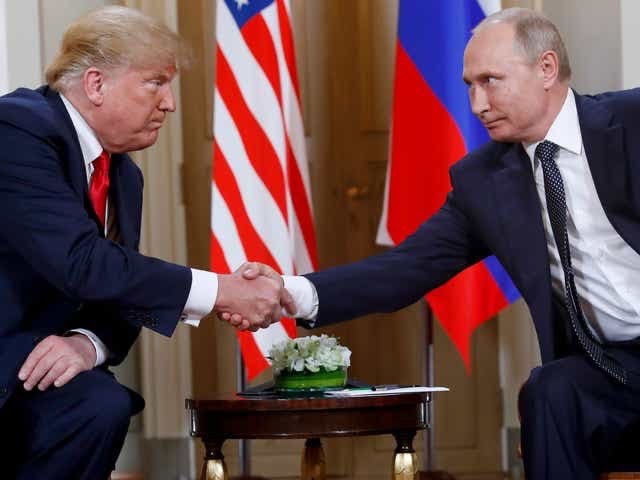 Trump thinks he can get Russia and China to agree on nuclear weapons? Not even close
Trump thinks he can get Russia and China to agree on nuclear weapons? Not even close
Opinion: A three-way nuclear deal with Russia and China is non-starter. And isn’t a true America-first approach. There’s a better way.
ROBERT ROBB | ARIZONA REPUBLIC | 3 hours ago
President Donald Trump conducts foreign policy the same way he conducts domestic policy: by instinct and impulse.
For the most part, this has meant ad hoc responses to events. With rare exceptions, such as moving the American embassy in Israel to Jerusalem, the Trump administration’s foreign policy has been reactive rather than proactive.
There is another curious exception, but one that still seems motivated by instinct and impulse, rather than reflecting some overarching strategic approach to managing the relationship between the United States and the rest of the world.
The New START accord with Russia, which limits the number of long-range nuclear warheads each possesses, expires in February. The accord, negotiated by the Obama administration, has a provision to extend it for five years by mutual consent.
Rather than do that, Trump wants a three-way deal with Russia and China. And to have the agreement cover all nuclear weapons – long-range and shorter-range tactical weapons, where Russia and China have a geopolitical advantage at the moment.
Trump has appointed a negotiator, Marshall Billingslea, to try to wangle such a deal. And Billingslea recently announced plans to meet with a Russian counterpart to begin the discussions.
This is sure to be a non-starter for various reasons. But what is the strategic purpose?
Russia and China are going to cheat
Yes, it would be valuable to limit Russian and Chinese tactical nuclear weapons. And it would be valuable to limit the expected increase in China’s nuclear arsenal.
But, if anything has been proven in a half century of arms control agreements, it is that Russia will cheat. No verification regimen will be rigorous enough to detect precisely when the Russians cheat or the extent to which they have cheated. And no enforcement regimen will be tough enough to deter or correct the cheating.
Russia under Vladimir Putin is certain to continue cheating. And there is no question that China under Xi Jinping will also cheat. Under current leadership, these are not trustworthy regimes.
Now, there are those who believe that arms control agreements are worthwhile even though cheating is likely. Perhaps, even after the cheat, there are fewer nukes than there otherwise would be. And, these advocates believe, there is intrinsic value in engaging potential adversaries in an arms control process, even if the results aren’t optimal.
The Trump administration, heretofore, hasn’t shared that view. In fact, it has withdrawn from two arms control deals explicitly because Russia was cheating on them. One of them limited intermediate land-based missiles. The other was a protocol permitting aerial surveillance for verification purposes.
If existing arms control deals with Russia aren’t worth keeping because Russia cheats, why negotiate a new one? And add another party, China, also sure to cheat?
There is no chance for a deal
Particularly when the likelihood of success is nil.
Russia is willing to enter into the talks. But, if negotiations are expanded to include China’s nukes, Russia wants them further expanded to include those of Britain and France.
This is not an unreasonable position. China is thought to have around 320 nuclear warheads. Britain and France combined are thought, with greater certainty, to have nearly 500. China is expected to increase its arsenal markedly, while Britain and France are not.
Still, there is not much of a rationale to including China but excluding Britain and France, except that the United States doesn’t perceive a nuclear threat from Britain and France. That will be unpersuasive to Russia, for whom Britain and France’s arsenal is geopolitically significant.
China has refused to even consider a three-way deal or enter into three-way negotiations. And it’s hard to imagine any deal to which it might even possibly agree.
China has a fraction of the nuclear weapons that the United States and Russia possess. It sees itself as a rising world power. It won’t enter into an agreement that locks in its inferior position.
Nor will the United States agree to allow China to increase nukes to our position, or reduce our nukes to China’s level. Nor would Russia for that matter.
What Trump should do instead
A true America-first approach to nuclear weapons wouldn’t involve a quixotic quest for a three-way deal. It would involve a clear-eyed assessment of what nuclear deterrent the United States needs to protect our country and our security interests.
The answer would probably be a much smaller arsenal, but one with more modern and flexible warheads and delivery systems.
But that wasn’t the direction that caught Trump’s fancy.
Reach Robb at robert.robb@arizonarepublic.com.
No comments:
Post a Comment